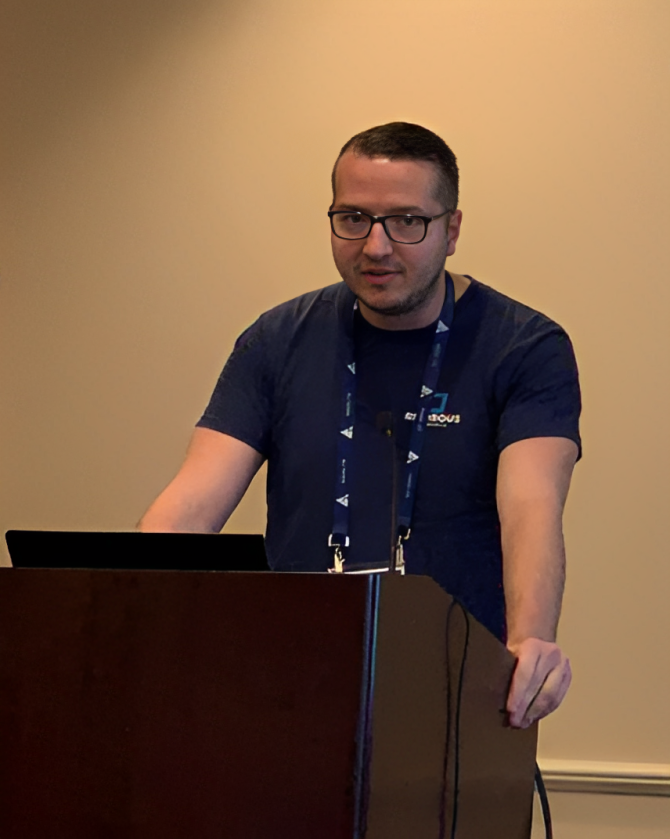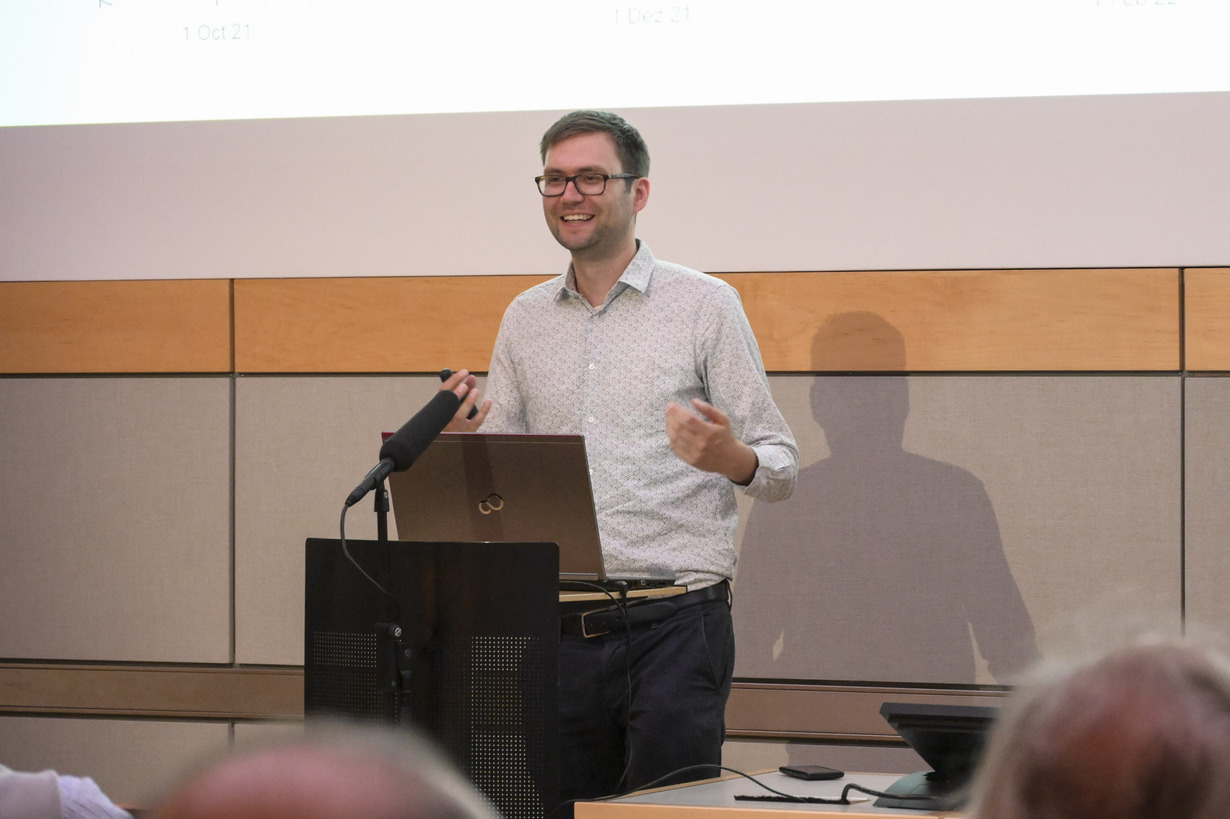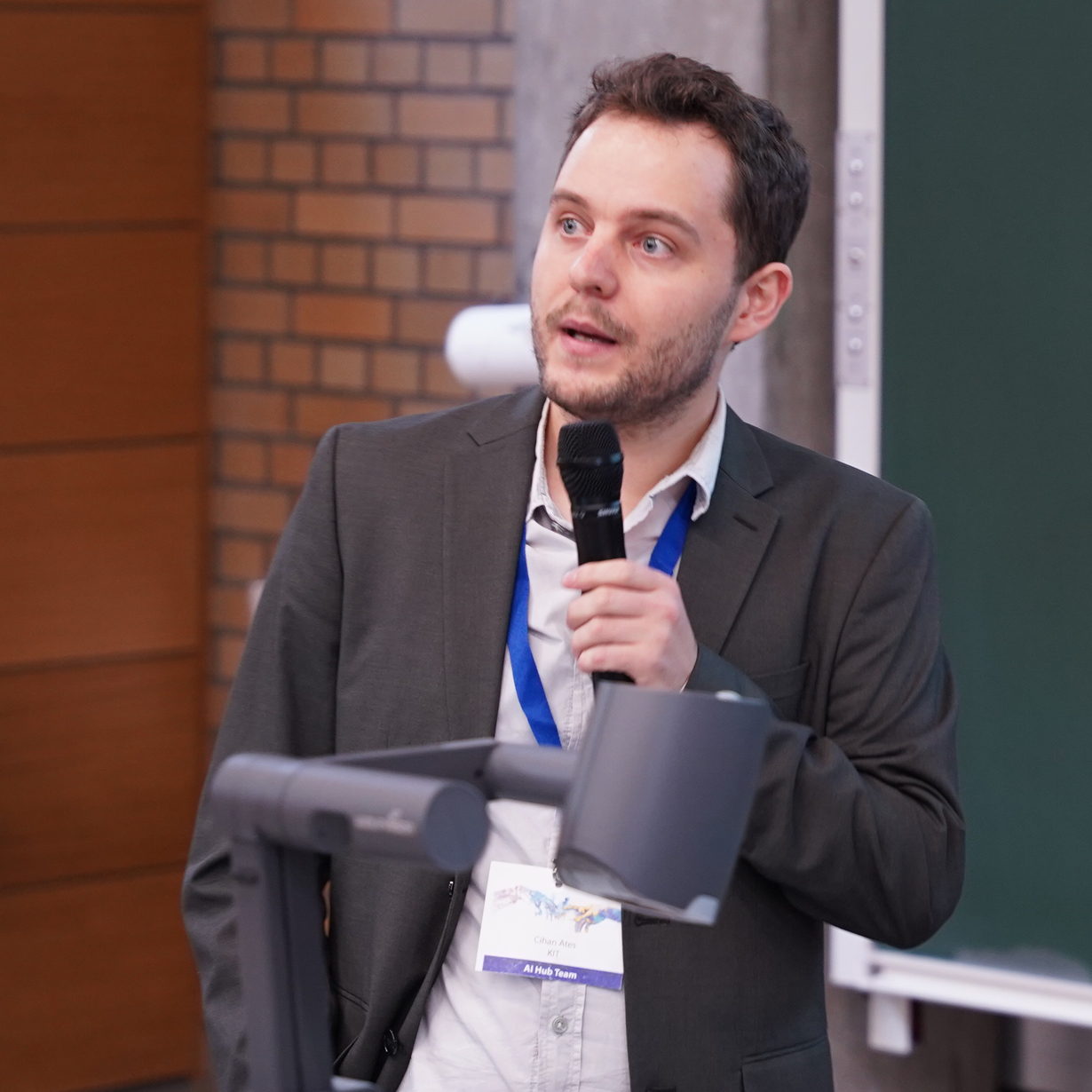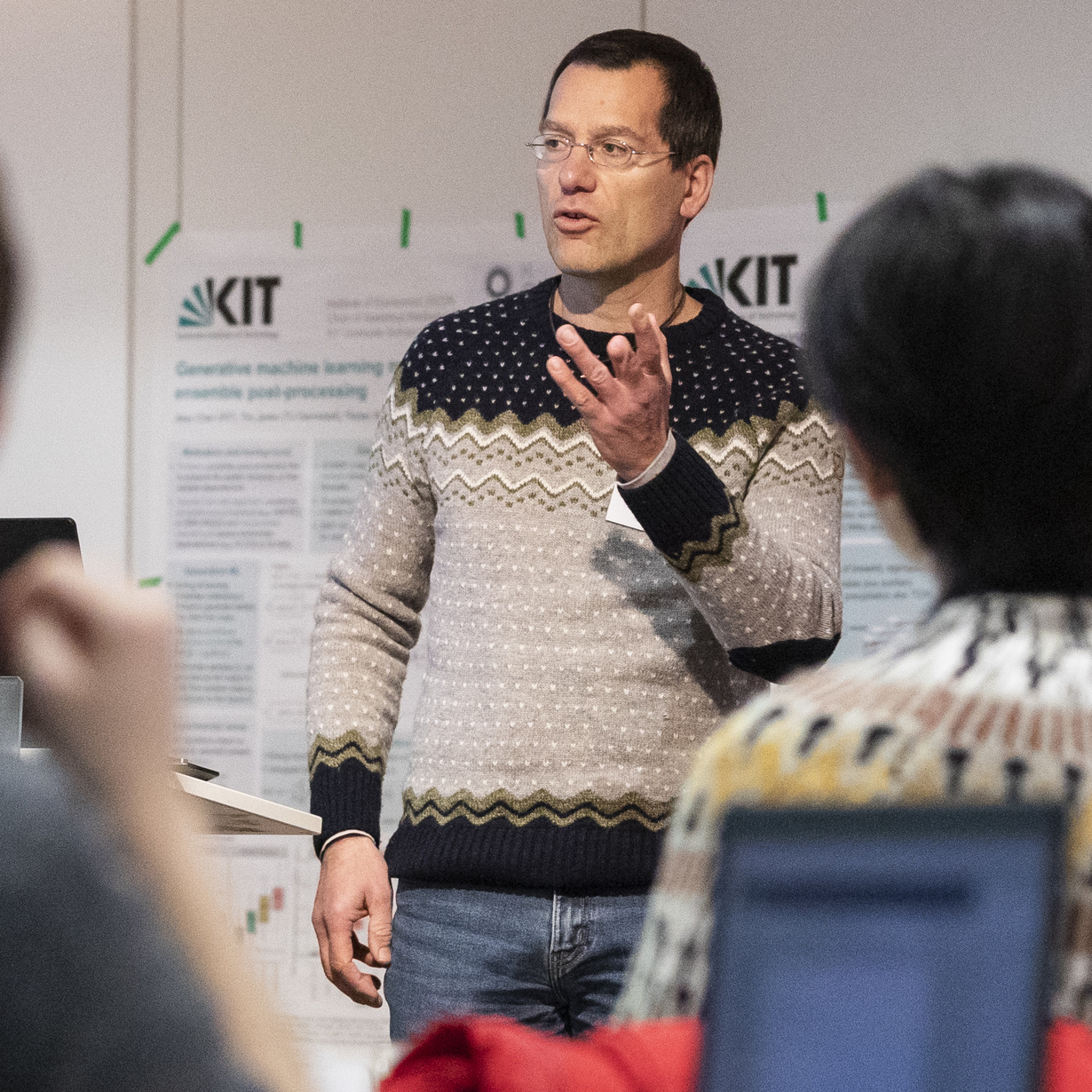building 20.30, room 0.014
Aretha Teckentrup, Thomas O'Leary-Roseberry
The program includes short courses on the following topics:
Neural Operators: Thomas O'Leary-Roseberry (University of Texas), confirmed.
Gaussian Processes: Aretha Teckentrup (University of Edinburgh), confirmed.
Link between Gaussian Processes and Neural Networks (incl. Neural Operators): Tobias Weber (U Tübingen), confirmed.
Further, you can expect:
poster session and networking dinner on the first day
social event in the evening on the second day
sessions that combine mathematical theory with application and real-life examples
tutorial-style sessions with application examples on day three
KCDS members as well as doctoral researchers from KIT and other universities/ research centers are welcome to join! There is no participation fee. Please note that KCDS doesn't cover travel and accomodation expenses.
building 20.30, room 0.014
Aretha Teckentrup, Thomas O'Leary-Roseberry
The program includes short courses on the following topics:
Neural Operators: Thomas O'Leary-Roseberry (University of Texas), confirmed.
Gaussian Processes: Aretha Teckentrup (University of Edinburgh), confirmed.
Link between Gaussian Processes and Neural Networks (incl. Neural Operators): Tobias Weber (U Tübingen), confirmed.
Further, you can expect:
poster session and networking dinner on the first day
social event in the evening on the second day
sessions that combine mathematical theory with application and real-life examples
tutorial-style sessions with application examples on day three
KCDS members as well as doctoral researchers from KIT and other universities/ research centers are welcome to join! There is no participation fee. Please note that KCDS doesn't cover travel and accomodation expenses.
building 20.30, room 0.014
Aretha Teckentrup, Thomas O'Leary-Roseberry
The program includes short courses on the following topics:
Neural Operators: Thomas O'Leary-Roseberry (University of Texas), confirmed.
Gaussian Processes: Aretha Teckentrup (University of Edinburgh), confirmed.
Link between Gaussian Processes and Neural Networks (incl. Neural Operators): Tobias Weber (U Tübingen), confirmed.
Further, you can expect:
poster session and networking dinner on the first day
social event in the evening on the second day
sessions that combine mathematical theory with application and real-life examples
tutorial-style sessions with application examples on day three
KCDS members as well as doctoral researchers from KIT and other universities/ research centers are welcome to join! There is no participation fee. Please note that KCDS doesn't cover travel and accomodation expenses.
KIT, Campus South
20.30 Seminar room 0.014
…
Prof. Dr. Oliver Stein (EBI), Dr.-Ing. Ali Shamooni (Uni Stuttgart)
Challenge
Turbulent flows — the chaotic, swirling motions you see in storm clouds, the wake behind an airplane wing, or the frothy swirls in your morning cup of coffee — span a vast range of interacting scales. Resolving every vortex from meter-wide eddies down to tiny millimeter-scale whirls requires grids with billions of points and supercomputers running for days or weeks. Coarse, low-resolution simulations run quickly but miss critical small-scale physics. The Hack the Turbulence hackathon challenges you to bridge this gap. Develop deep-learning models that take coarse turbulent flow data and reconstruct high-resolution fields, while respecting the underlying physics.
We invite students and researchers from mathematics, data science, engineering, and physics to join us for four days of hands-on innovation. Participants will enhance their skills in data analysis and scientific machine learning. They will also connect with researchers from different disciplines and get hands-on experience with KIT's supercomputer cluster.
This event is organized by machine learning enthusiasts from KCDS, with support from KIT and SCC.
KIT, Campus South
20.30 Seminar room 0.014
…
Prof. Dr. Oliver Stein (EBI), Dr.-Ing. Ali Shamooni (Uni Stuttgart)
Challenge
Turbulent flows — the chaotic, swirling motions you see in storm clouds, the wake behind an airplane wing, or the frothy swirls in your morning cup of coffee — span a vast range of interacting scales. Resolving every vortex from meter-wide eddies down to tiny millimeter-scale whirls requires grids with billions of points and supercomputers running for days or weeks. Coarse, low-resolution simulations run quickly but miss critical small-scale physics. The Hack the Turbulence hackathon challenges you to bridge this gap. Develop deep-learning models that take coarse turbulent flow data and reconstruct high-resolution fields, while respecting the underlying physics.
We invite students and researchers from mathematics, data science, engineering, and physics to join us for four days of hands-on innovation. Participants will enhance their skills in data analysis and scientific machine learning. They will also connect with researchers from different disciplines and get hands-on experience with KIT's supercomputer cluster.
This event is organized by machine learning enthusiasts from KCDS, with support from KIT and SCC.
KIT, Campus South
20.30 Seminar room 0.014
…
Prof. Dr. Oliver Stein (EBI), Dr.-Ing. Ali Shamooni (Uni Stuttgart)
Challenge
Turbulent flows — the chaotic, swirling motions you see in storm clouds, the wake behind an airplane wing, or the frothy swirls in your morning cup of coffee — span a vast range of interacting scales. Resolving every vortex from meter-wide eddies down to tiny millimeter-scale whirls requires grids with billions of points and supercomputers running for days or weeks. Coarse, low-resolution simulations run quickly but miss critical small-scale physics. The Hack the Turbulence hackathon challenges you to bridge this gap. Develop deep-learning models that take coarse turbulent flow data and reconstruct high-resolution fields, while respecting the underlying physics.
We invite students and researchers from mathematics, data science, engineering, and physics to join us for four days of hands-on innovation. Participants will enhance their skills in data analysis and scientific machine learning. They will also connect with researchers from different disciplines and get hands-on experience with KIT's supercomputer cluster.
This event is organized by machine learning enthusiasts from KCDS, with support from KIT and SCC.
KIT, Campus South
20.30 Seminar room 0.014
…
Prof. Dr. Oliver Stein (EBI), Dr.-Ing. Ali Shamooni (Uni Stuttgart)
Challenge
Turbulent flows — the chaotic, swirling motions you see in storm clouds, the wake behind an airplane wing, or the frothy swirls in your morning cup of coffee — span a vast range of interacting scales. Resolving every vortex from meter-wide eddies down to tiny millimeter-scale whirls requires grids with billions of points and supercomputers running for days or weeks. Coarse, low-resolution simulations run quickly but miss critical small-scale physics. The Hack the Turbulence hackathon challenges you to bridge this gap. Develop deep-learning models that take coarse turbulent flow data and reconstruct high-resolution fields, while respecting the underlying physics.
We invite students and researchers from mathematics, data science, engineering, and physics to join us for four days of hands-on innovation. Participants will enhance their skills in data analysis and scientific machine learning. They will also connect with researchers from different disciplines and get hands-on experience with KIT's supercomputer cluster.
This event is organized by machine learning enthusiasts from KCDS, with support from KIT and SCC.
KIT Campus South, building 20.30, seminar room 2.058
Dr. rer. nat. Patrick Erik Bradley, KIT, Institute of Photogrammetry and Remote Sensing (IPF)
Highdimensional data are implicitly obtained in classification and regression tasks by certain supervised learning algorithms like e.g. Support Vector Machine through Mercer's Theorem. An example where data is explicitly presented in high dimension is given by hyperspectral data. Due to the "curse of dimensionality", dimension-reduction methods become important. Since data are often non-linear, manifold learning techniques are of interest.
The 3-day workshop "Topological Data Analysis and Manifold Learning using Ultrametrics" aims to introduce methods inspired by topology and manifolds for the analysis of high-dimensional data, as well as to practically incorporate some novel ideas from ultrametric analysis in order to obtain faster algorithms. The idea is to test these methods on datasets of interest by the participants and to aim at collaboratively producing novel experimental results, at least in the aftermath of this workshop.
This workshop is brought to you in cooperation of graduate schools KCDS and GRACE. Everyone interested is welcome to join! - For graduate school members, successful participation will be credited with 2 CP.
KIT Campus South, building 20.30, seminar room 2.058
Dr. rer. nat. Patrick Erik Bradley, KIT, Institute of Photogrammetry and Remote Sensing (IPF)
Highdimensional data are implicitly obtained in classification and regression tasks by certain supervised learning algorithms like e.g. Support Vector Machine through Mercer's Theorem. An example where data is explicitly presented in high dimension is given by hyperspectral data. Due to the "curse of dimensionality", dimension-reduction methods become important. Since data are often non-linear, manifold learning techniques are of interest.
The 3-day workshop "Topological Data Analysis and Manifold Learning using Ultrametrics" aims to introduce methods inspired by topology and manifolds for the analysis of high-dimensional data, as well as to practically incorporate some novel ideas from ultrametric analysis in order to obtain faster algorithms. The idea is to test these methods on datasets of interest by the participants and to aim at collaboratively producing novel experimental results, at least in the aftermath of this workshop.
This workshop is brought to you in cooperation of graduate schools KCDS and GRACE. Everyone interested is welcome to join! - For graduate school members, successful participation will be credited with 2 CP.
KIT Campus South, building 20.30, seminar room 2.058
Dr. rer. nat. Patrick Erik Bradley, KIT, Institute of Photogrammetry and Remote Sensing (IPF)
Highdimensional data are implicitly obtained in classification and regression tasks by certain supervised learning algorithms like e.g. Support Vector Machine through Mercer's Theorem. An example where data is explicitly presented in high dimension is given by hyperspectral data. Due to the "curse of dimensionality", dimension-reduction methods become important. Since data are often non-linear, manifold learning techniques are of interest.
The 3-day workshop "Topological Data Analysis and Manifold Learning using Ultrametrics" aims to introduce methods inspired by topology and manifolds for the analysis of high-dimensional data, as well as to practically incorporate some novel ideas from ultrametric analysis in order to obtain faster algorithms. The idea is to test these methods on datasets of interest by the participants and to aim at collaboratively producing novel experimental results, at least in the aftermath of this workshop.
This workshop is brought to you in cooperation of graduate schools KCDS and GRACE. Everyone interested is welcome to join! - For graduate school members, successful participation will be credited with 2 CP.
KIT Campus South, Building 40.32, Room 239 (Institut für Mess- und Regelungstechnik, Engler-Bunte-Ring 21, 76131 Karlsruhe)
Dr. Carsten Rohr, Soft Skills for Hard Science
2-day on-site workshop on November 4+5, 2025 on KIT Campus South
As a scientist, presenting your findings is essential, whether in a group seminar, at a conference, or during your Ph.D. defense. However, effective science presentation is more than just sharing data.
The topics covered by this workshop are:
Planning and structure
Memorable start and ending
Speech, voice, and body language
Create meaningful graphics
Slide composition
Difficult situations
The training is a workshop, meaning that the participants apply the learned material to their presentations right there. Therefore, everybody should bring presentations (old or upcoming ones) to work with.
Speaking the same language is a great advantage for tailoring presentations effectively. Another important point: Most scientists talk about their topic with shining eyes. Often, that excitement is gone the moment they stand in front of a crowd. To tap into this enthusiasm during your talk is particularly important. For that enthusiasm to reappear, you need to feel safe with what you are doing in your presentation.
Brought to you by Institute of Measurement and Control Systems (MRT) and KCDS.
KIT Campus South, Building 40.32, Room 239 (Institut für Mess- und Regelungstechnik, Engler-Bunte-Ring 21, 76131 Karlsruhe)
Dr. Carsten Rohr, Soft Skills for Hard Science
2-day on-site workshop on November 4+5, 2025 on KIT Campus South
As a scientist, presenting your findings is essential, whether in a group seminar, at a conference, or during your Ph.D. defense. However, effective science presentation is more than just sharing data.
The topics covered by this workshop are:
Planning and structure
Memorable start and ending
Speech, voice, and body language
Create meaningful graphics
Slide composition
Difficult situations
The training is a workshop, meaning that the participants apply the learned material to their presentations right there. Therefore, everybody should bring presentations (old or upcoming ones) to work with.
Speaking the same language is a great advantage for tailoring presentations effectively. Another important point: Most scientists talk about their topic with shining eyes. Often, that excitement is gone the moment they stand in front of a crowd. To tap into this enthusiasm during your talk is particularly important. For that enthusiasm to reappear, you need to feel safe with what you are doing in your presentation.
Brought to you by Institute of Measurement and Control Systems (MRT) and KCDS.









